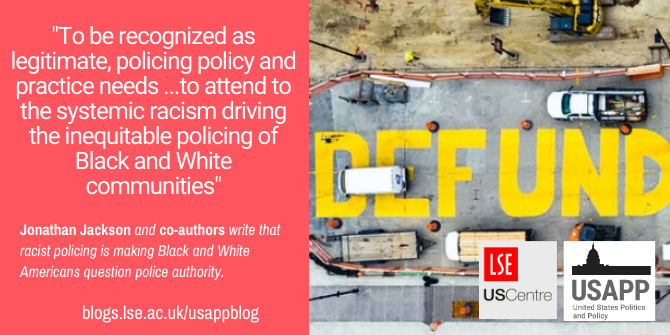 In new research based on a nationwide survey of 1,500 Americans, Jonathan Jackson and co-authors find that years of racially targeted policing is leading people to question the fairness and legitimacy of the police, such that 40 percent believe that the police should be defunded. Regardless of respondents’ race, they find that concerns about the under-protection and over-regulation of Black communities may be threatening the public support that police fundamentally rely upon.
In new research based on a nationwide survey of 1,500 Americans, Jonathan Jackson and co-authors find that years of racially targeted policing is leading people to question the fairness and legitimacy of the police, such that 40 percent believe that the police should be defunded. Regardless of respondents’ race, they find that concerns about the under-protection and over-regulation of Black communities may be threatening the public support that police fundamentally rely upon.
The history of policing in America is an indisputably violent one. Many American police departments have their origins in White supremacist violence—for example, hunting down Black Americans who had freed themselves from enslavement and returning them to their captors.
Yet the specific form of racially targeted and increasingly militarized policing to which Americans have grown accustomed is not the only approach. A growing body of evidence suggests that public safety practices that are experienced as procedurally just, rather than scaring people into submission, can motivate public cooperation. Procedurally just approaches—treating people with dignity and respect, being open and accountable, explaining decisions, listening to people, making unbiased decisions, and conveying trustworthy motives—tend to engage people in a way that is more sustainable and durable than the use and threat of force.
Results of our new study suggest that these strategies may be more relevant than ever as longstanding structural racism in American policing (that has relied heavily on racially targeted violence and lightly on procedural justice) undermines public acceptance of police authority for Black and White Americans alike. In addition to showing the foundational role that procedural justice plays in police legitimacy, we find that the perceived over-policing and under-protection of Black communities informs the more foundational assessments of police fairness that legitimacy relies upon, in turn predicting support for defunding the police.
We asked 1,500 Americans—selected using Prolific Academic’s ‘nationally representative quota sample’ to resemble the general US population with regard to age, gender and ethnicity—whether they supported defunding the police, to what extent they saw the police legitimate, how willing they were to cooperate with law enforcement, and about their perceptions of police fairness, racial bias, misconduct and violence. The data were collected in late June, just after the killing of George Floyd by a police officer and the resulting resurgence of the Black Lives Matter movement.
The importance of procedural justice to perceptions of police legitimacy
Our goal was to start to build systemic racism into the powerful account of police-citizen relations that is procedural justice theory. Inspired by scholars such as Tom Tyler and Tracey Meares at Yale Law School and Jeff Fagan at Columbia Law School, there is a good deal of prior evidence that police activity experienced as procedurally just (respectful, open and accountable, explaining decisions and listening to people, making unbiased decisions, and conveying trustworthy motives) can motivate compliance, and does so in a way that is more sustainable and durable than the presentation of deterrent threat. In short, the police should be using consensual rather than coercive tactics.
Consistent with this, we found that procedural justice was the single most important factor in perceptions of police legitimacy: people who thought that the police in their neighborhood frequently ‘made fair and impartial decisions in the cases they deal with’, ‘explained their decisions to the people they deal with’ and ‘treat people with respect’ also tended to accept the authority of the police. This held regardless of respondents’ race.
Our findings also highlight the importance of distributive justice—or the fair allocation of finite resources across aggregate social groups—in policing. People who agreed with statements like ‘the police provide the same level of security to all community members’ and ‘the police deploy their resources in this city in an equitable manner’ also tended to view the police as legitimate.
Over-policing means that White Americans are also questioning the legitimacy of the police
We also wanted to understand whether people thought that Black communities receive systematically less protection and substantially more regulation than other communities. We wondered whether this injustice, rooted in decades of racism, diminished the perceived (procedural and distributive) fairness of policing as an institution and thereby delegitimized it in the eyes of the public.
We asked survey questions like ‘The police do not care about responding quickly to emergencies in African American communities’ and ‘The police do not protect African American communities’ (under-policing) and questions like ‘The police tend to treat African Americans as if they might be dangerous or violent’ and ‘Police officers tend to escalate to violence more easily when dealing with African Americans’ (over-policing).
In light of a long history of White Americans’ ignorance of structural racism, we found that concerns about under-protection and over-policing in Black communities were even more strongly correlated with the belief that the police are systemically racist among White respondents than they were among Black respondents.

“DEFUND POLICE” by ken fager is licensed under CC BY NC SA 2.0
We also found that, among all respondents, concerns about the under-protection of Black communities were strongly correlated with distributive injustice (i.e. the failure to protect Black communities appropriately was linked to the general sense of unfair allocation of the benefits and burdens of policing that in turn erodes the authority of the police in people’s eyes) and procedural injustice. This suggests that Black and White respondents alike view under-protection of Black communities not only as an unjust misuse of finite police resources (distributive injustice), but also as a failure to treat people with respect, have their best interests at heart, and make fair decisions (procedural injustice).
Moreover, for Black and White Americans alike, over-policing was important in a way that bypassed the roles that procedural and distributive injustice played: those who believed that the police treat Black communities primarily as targets of regulation and control also tended to view the police as less legitimate, over and above the crucial roles that procedural and distributive justice played in legitimating police authority.
So, while procedural justice was key, the over-regulation and under-protection of Black communities played an important role in informing the public’s perceptions of police fairness and legitimacy. This suggests that, to be recognized as legitimate, policing policy and practice needs not only to focus generally on principles of fairness and accountability, but also to attend to the systemic racism driving the inequitable policing of Black and White communities.
Defunding the police
Finally, we found that over 40 percent of those surveyed agreed with the statement, “Police in the US should be defunded”. Survey participants were asked to define what “de-funding” meant to them: around 40 percent indicated that it meant eliminating police departments, around 40 percent thought it meant shifting some police funding to other agencies (“to prioritize things like housing, employment, community health, and education”), and around 20 percent believed it meant to “fundamentally reform” policing.
Belief that the police should be defunded were strongly linked to perceptions of police illegitimacy and particularly the feeling that Black communities are over-criminalized by the police. Crucially, these findings were irrespective of the race of the research participants.
Structural racism seems to be undermining police legitimacy
In recent decades, public views of policing and structural racism were clearly split along racial lines. Poor perceptions were dismissed by media outlets, police departments, police unions and many policymakers as being the opinions of a few angry protestors and marginalized minority voices. However, these new data show that the public’s views of policing and structural racism are, perhaps more so than ever before, converging across previously polarized segments of the American population. Over-policing and under-policing were core concerns, and many supported de-funding police (with its varying definitions), seemingly because structural racism is leading them to question their own fundamental beliefs in the fairness and legitimacy of police as an institution.
In the weeks since the murders of George Floyd and Breonna Taylor, the world has witnessed American police forces unleashing a stunning array of violent tactics against demonstrators—tactics that those in our nationally representative sample clearly abhor. Perhaps even more tellingly, police seem to have redoubled their defense of the prerogative to use violence against civilians in a broad array of non-violent, non-threatening encounters. In Buffalo, for example, 57 police officers resigned from the city’s emergency response team in defense of two peers who had shoved a 75-year-old peace activist to the ground, left him on the sidewalk, and submitted a falsified report of the incident as he lay in critical condition from the head injury—even in the face of a widely-circulated video of the violent incident.
Policing, and indeed the entire American legal system, is at a crossroads. People are unwilling to cooperate with a police force they see as illegitimate, and in the absence of public cooperation, police rely even further on the use and threat of force. This is a vicious cycle, but it is one that can be broken.
The critical tasks of protecting public safety and responding to harm have, historically, been assigned to police forces. Yet America has now reached the point where there is substantial support for de-funding police because the legitimacy of American police forces has faltered. Now, with increasingly broad objections, we must build a new kind of public safety that stands on a different set of values: fairness, equity and respect for human dignity.
Please read our comments policy before commenting.
Note: This article gives the views of the author, and not the position of USAPP – American Politics and Policy, nor the London School of Economics.
Shortened URL for this post: https://bit.ly/2Czu5Do
About the authors
 Jonathan Jackson – LSE Methodology
Jonathan Jackson – LSE Methodology
Jonathan Jackson is Professor and Head of the Department of Methodology at the LSE, Honorary Professor at University of Sydney Law School, and an Affiliated Scholar at Yale Law School’s Justice Collaboratory.
 Tasseli McKay – LSE Social Policy
Tasseli McKay – LSE Social Policy
Tasseli McKay is a researcher in the Youth, Violence and Community Justice Program at RTI International, a doctoral candidate in Social Policy at the London School of Economics, and lead author of Holding On: Fatherhood and Family During and After Incarceration (University of California Press, 2019).
 Leonidas Cheliotis – LSE Social Policy
Leonidas Cheliotis – LSE Social Policy
Leonidas Cheliotis is Associate Professor in the Department of Social Policy at the London School of Economics and Director of LSE’s Mannheim Centre for Criminology.
 Adam Fine – Arizona State University
Adam Fine – Arizona State University
Adam Fine is Assistant Professor in the School of Criminology and Criminal Justice at Arizona State University.
 Rick Trinkner – Arizona State University
Rick Trinkner – Arizona State University
Rick Trinkner is Assistant Professor in the School of Criminology and Criminal Justice at Arizona State University.
 Ben Bradford – University College London
Ben Bradford – University College London
Ben Bradford is Professor of Global City Policing in the Department of Security and Crime Science at University College London.






